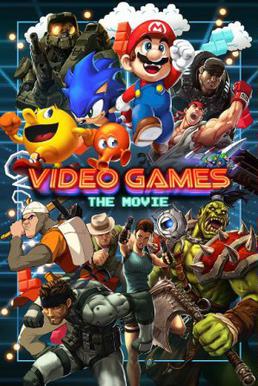Review on Video Games: The Movie
by Edmund Phoon Jian Cheng

Picture Credit: https://en.wikipedia.org/wiki/File:Video_Games_-_The_Movie.jpg
Video games are here, and they are here to stay, says Sean Astin, the former Lord of the Rings actor who now narrates this documentary Video Games: The Movie. The 2014 show, written by Jeremy Snead as his first feature film, summarises the topic of how it plays and came to be an important role in the entertainment industry. When watching the 1 hour and 40 minute film, there are some informative facts about video games we have never learnt before, which makes it a great educational video. However, it appears that the documentary has its own flaws in terms of content usage, probably to the eyes of many enthusiastic gamers and non-gamers.
Video Games: The Movie comprises of the history, culture, creation and future of the games, with each chapter introduced accompanied by a quote from certain key characters (including Nikola Tesla and John. F. Kennedy). The show begins with various statistics of number of gamers, their age, how often gamers play, game purchases and the use of parental control, before it moves to a chronological timeline that depicts the birth and evolution of video games from the retro age (e.g. Pong and Space War) to the modern era, with each year event consisting of a new invention of the console and the games released on their respective years based on the type of platform used. The show then moves on to addressing the culture and creation of the games, discussing the development of storytelling (which in turns increases the complexity of the type of gameplays made), the social interactions and feelings of gamers, problem solving, and controversies of violence in gaming. Along the way, there are interviews with company leads (e.g. Nolan Bushnell, the co-founder of Atari) and developers, publishers and consumers who discuss about video games and share their opinions. What makes the film interesting is that it managed to get hold of archive footages of the commercials advertising the old game products and its consoles to be featured under the ‘History’ chapter. The documentary is also made more enjoyable to watch, when some of our favourite and classic video games we know today (e.g. Mario, Pac Man, Sonic, Tomb Raider and Warcraft) are displayed. The film ends off with the implementation of virtual reality that might replace the traditional game consoles over the next generation in regards to the topic of the future of video gaming.
While Video Games: The Movie serves as a learning experience, its organisational structure of content is problematic to most viewers. Yes, the chronological timeline is necessary, but because of the separate chapters and the film's certain key points, most of the focus jump too quickly and often from one point to another rather than sticking to first to the end. This makes it difficult and frustrating for viewers to catch up with the topic in depth. Another drawback is that the show did not make clear indication of its main target audience, despite the fact it does showcase the type of ratings for video games. Anyone can be viewing the documentary, but several parts of the film discuss the controversial topic on violence in the games and showing fairly bits of violence in games, that can be disturbing to young children. The film also tends to overuse multiple footages, both old and new alike, to form montages which takes up some length of the movie, as if they are showing off the awesomeness in video gaming. These could have been replaced with more information that explains on several aspects such as the new game consoles Nintendo Wii and PlayStation 4 that are shown on the timeline and are only briefly mentioned in the documentary.
I may have spent less time on playing video games nowadays which reduces my interest of doing so, but that does not dissuade me from watching the film. In fact, it has given me a brief insight and understanding of how the games are made and how they have created an impact in our lives. Other than the poor narrative structure and over-usage of videos that bring about the setbacks, this documentary still deserves credit for the large amounts of effort Snead has put in for casting the participants of the show to be interviewed, the inclusion of old footages that gives the nostalgic feeling, and the director's sharing of the necessary information that appeals to most viewers and are worth knowing.
No comments:
Post a Comment